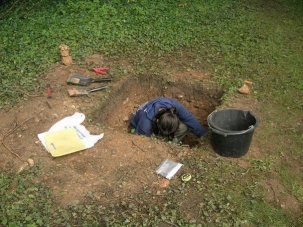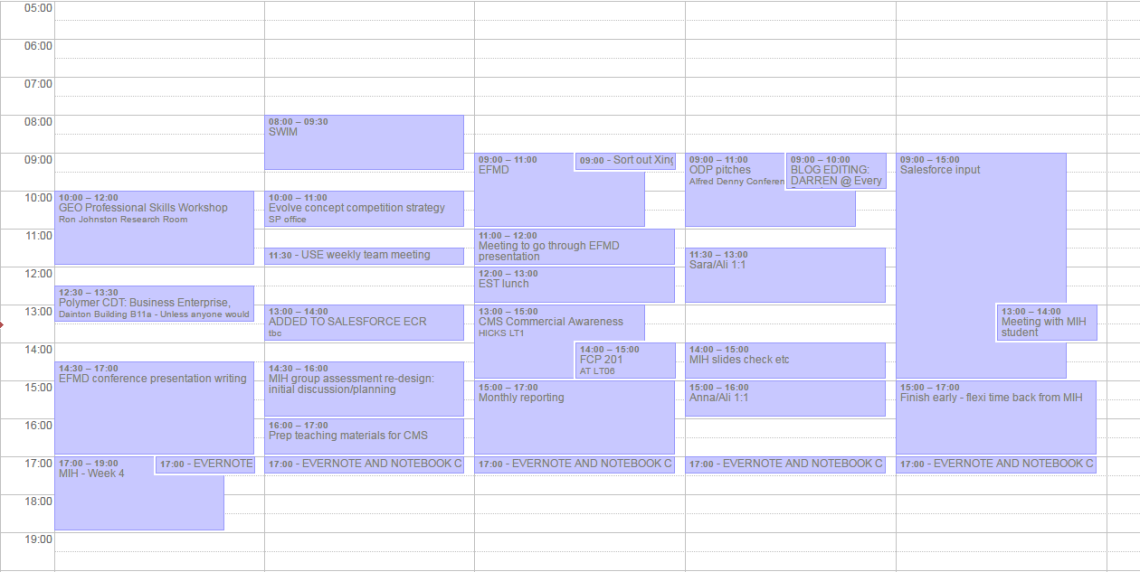Each Friday we post a new v i s t a profile, a career beyond the academy story (use the tags at the bottom of the post to find the entire list). These posts accompany our curated events to support post-PhD career transitions, v i s t a mentoring, and also #sheffvista on Twitter.
Twitter: @alisheff
Job title and company: Enterprise Education Manager, The University of Sheffield
Approximate salary range for your type of role: ~£28-38k
I’ve been at The University of Sheffield for thirteen years now, first as a student and now as a member of staff – I often joke that I’m institutionalised! I never really planned it that way, however, it just seems to be how my career and my personal life have conspired together through happenstance.
 I studied archaeology to PhD level, but now I work in curriculum development and enterprise education – sometimes I wonder myself exactly how that happened!
I studied archaeology to PhD level, but now I work in curriculum development and enterprise education – sometimes I wonder myself exactly how that happened!
When I was in the final stages of submitting my thesis, I applied for a range of jobs – and I’ll be honest, initially I was looking for a job that would tide me over until I found an academic post in archaeology, and help relieve some of the financial burden I’d put myself under by continuing into the fourth year. I applied for a range of jobs within universities that were broadly related to learning and teaching and curriculum development. This was due to the fact that I had done some part time work in curriculum development alongside my studies. I got a job with University of Sheffield Enterprise as an Enterprise Learning Development Officer as maternity leave cover… And I’m still here five years later!
 How did that happen? Well, in the process of finishing up my thesis and beginning this job, I did a lot of reflecting and concluded that a research career wasn’t for me. In taking a non-academic job, I began to see huge positives in a life outside academia, including, crucially, the opportunity to indulge a broader range of interests, and achieve a better work-life balance. And what was more, I was discovering that I was really good at this job, and was really enjoying the work! So, when the opportunity to make my contract permanent came up, I jumped. A couple of years ago, I was then promoted to a manager role.
How did that happen? Well, in the process of finishing up my thesis and beginning this job, I did a lot of reflecting and concluded that a research career wasn’t for me. In taking a non-academic job, I began to see huge positives in a life outside academia, including, crucially, the opportunity to indulge a broader range of interests, and achieve a better work-life balance. And what was more, I was discovering that I was really good at this job, and was really enjoying the work! So, when the opportunity to make my contract permanent came up, I jumped. A couple of years ago, I was then promoted to a manager role.
It’s not easy to sum up in a sentence what my job is, but I’ll try. Essentially, I support staff who teach in the university to innovate in their taught curriculum to incorporate the development of ‘enterprise capabilities’, including authentic problem-solving, innovation and creativity, measured risk-taking and leadership. A long sentence, but I hope it makes sense! It’s partly curriculum development, partly professional academic development, with a particular ‘angle’ of enterprise. (If you’re interested, you can read more about USE).
My days are hugely varied, something I really love about the job. I could be direct teaching or facilitating skills development sessions for students, or meeting one on one with teaching staff to design new assessments, or running an away day for a department, or reporting on impact. So while most of my contact is with teaching staff within the University, I do get to spend a fair amount of time with students too.
 Working in enterprise, I am positively encouraged to apply an entrepreneurial approach to what I do, so that leads me to end up with fingers in all sorts of pies. In fact that really sums up our whole department’s approach to the way it works – we’re a diverse bunch but what really connects us is that we are ‘yes’ people, ‘glass half full’ people, people who get stuck in.
Working in enterprise, I am positively encouraged to apply an entrepreneurial approach to what I do, so that leads me to end up with fingers in all sorts of pies. In fact that really sums up our whole department’s approach to the way it works – we’re a diverse bunch but what really connects us is that we are ‘yes’ people, ‘glass half full’ people, people who get stuck in.
Currently the biggest thing on my plate is assessment – we also run an enterprise module in the department and I teach and assess on this module. I’ll be marking 18 pitches, nine business plans and about 55 reflections over the coming weeks. I’ve been really happy that despite not being in an academic role, I’ve still been able to teach, something I really enjoyed in my PhD. And my own teaching practice directly informs my approach to supporting other teachers as well.
Compared to a career in academia, there are positives and negatives. I sometimes miss that opportunity to get thoroughly immersed in and obsessive about one thing – there are times in my job when I think ‘oooh there’s a research project in this’, but I just don’t have the time. BUT, on the other hand, there’s also no chance of getting bored, as all the balls I juggle are so different.
A hugely positive aspect is that I find that I have a much better work-life balance now, and hugely lowered levels of stress and anxiety than I did have whilst writing my thesis. Even though my job is demanding, with a fair amount of responsibility, it is much easier to separate work and home. I no longer feel guilty for not working at weekends! In a non-academic job role, I also find more opportunity to ask for and receive feedback on my progress and skills development, which has helped me to finally beat the ‘imposter syndrome’ that I think a lot of people suffer from in academia.
The transition between academic research and a non-academic job for me was fairly straightforward – I had always treated my PhD as a job, trying to work (at least) 9-5 and project manage my work, setting goals and milestones etc. However, in my new role, I did quickly find myself having to manage lots of small projects rather than one big one, so that was a learning curve I had to quickly negotiate! I think it helps that I had worked part time in other jobs during my studies – even the very basic jobs like waitressing taught me valuable skills about professional behaviour that I might not have learned from research.
For my role, it certainly isn’t essential to have a PhD. I think it is the skills I have learned through the PhD that have helped me to do well, rather than the PhD itself. For a learning and teaching role within a University, I think the key skills that can be transferred out of a PhD would be teaching itself (and an understanding of the principles of good learning and teaching), project management, and critical/analytical skills. For the first, there are a lot of opportunities to develop skills in learning and teaching during a PhD – for example by completing the Sheffield Teaching Assistant workshops and completing the personal pathway to Associate Fellowship of the Higher Education Academy.
Where can researchers look for jobs like yours? I looked for most of my jobs through www.jobs.ac.uk – a great source for professional services roles in universities.
What professional/accrediting bodies, or qualifications are relevant to where you work? Fellowship of the Higher Education Academy has been really important in my work as it is a way for me to demonstrate my knowledge and expertise in learning and teaching. I also completed a PGCert in Learning and Teaching. However, I did both of these things in the course of my job rather than them being a requirement before I started.
